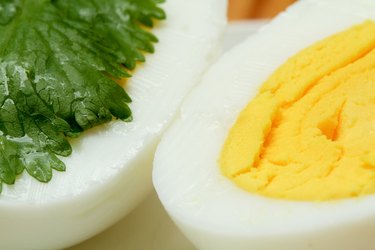
If you love hard-boiled eggs, you may wonder how that particular kind impacts your cholesterol health, as eggs have long been a controversial food when it comes to cholesterol. Here's the hard-boiled truth about eggs and cholesterol and whether or not that hard-boiled kind is good for your heart.
According to the USDA, a single large egg contains 186 milligrams of cholesterol. All of the cholesterol is located in the yolk, USDA notes, and eggs are one of the biggest nutritional sources of cholesterol, according to Harvard T.H. Chan School of Public Health.
Video of the Day
Video of the Day
That said, there is a difference between dietary cholesterol and your blood cholesterol, notes the Harvard School — and the former may not have much effect on the latter.
Read more: Everything You Need to Know About Hard-Boiled Eggs (and How to Cook Them to Perfection)
The Egg Myth
As the Harvard School explains, the cholesterol content of the food you eat is only weakly linked to high cholesterol. Instead, counter-intuitive as it may seem, it's dietary fat (specifically saturated and trans) — not dietary cholesterol — that's the real concern when it comes to driving up your "bad" cholesterol (aka low-density lipoprotein — LDL — levels).
Ontario, Canada-based registered dietitian and nutritional epidemiologist Russell de Souza, ScD, RD, says that "the body does a pretty good job of controlling the levels of cholesterol that circulate in the blood."
"When you eat more cholesterol from food, your body produces less cholesterol to compensate. On the other hand, when you eat less cholesterol from food, your body produces more cholesterol to compensate," de Souza says. "This is why the cholesterol from the foods we eat has a small impact on our blood cholesterol levels in most people."
Egg-ceptional Nutrition
So cracking the truth on whether hard-boiling your eggs might somehow change that equation, de Souza flatly dismisses the concern. "I have read nothing credible to suggest that hard-boiling, compared to other ways of cooking eggs, affects how your body processes the cholesterol in the egg," de Souza says. "This is probably a myth."
So, if eggs — hard-boiled or otherwise — are not a trigger for high cholesterol, then should they remain on your heart-healthy menu? It depends.
It's worth noting that, with its publication of the Dietary Guidelines for Americans 2015–2020, the USDA dropped its previous recommendation that Americans limit dietary cholesterol intake to a maximum of 300 milligrams per day. The current recommendation is that people eat as little dietary cholesterol as possible while consuming a healthy eating pattern low in saturated fats.
Hmm. But what about your egg's fat content?
"Only one-third of the fat in an egg yolk is saturated fat," de Souza says. "And many varieties of eggs are now rich in omega-3 and essential omega-6 fatty acids and fat-soluble vitamins — including A, D and E." The Harvard School of Public Health adds that eggs are also packed with:
- Protein.
- Biotin (vitamin B7).
- Choline.
- Antioxidants lutein and zeaxanthin.
De Souza points out that the lutein and zeaxanthin in eggs is good for your eye health; and choline is an essential nutrient for your brain. His bottom line: "The average healthy person likely suffers no harm from eating up to seven eggs per week."
Eating Eggs the Smart Way
Keep in mind that everyone's nutrition needs are different, so de Souza says that although eggs are not an issue for most people, "if a reputable health professional — meaning a doctor who doesn't sell diet books, or a registered dietitian — has told you to avoid eggs because you have a genetic tendency to high cholesterol, you should follow her or his advice."
And don't forget the egg whites — hard-boiled or otherwise. As the Harvard School points out, egg whites, which are 100 percent cholesterol-free, could be a smart way to go if you are concerned about your LDL levels.
To safeguard your heart, Harvard experts also urge egg lovers to steer clear of all those heart-unhealthy extras — think cheese, sausage, home fries and white toast — that might turn an otherwise healthy egg dish into a fully loaded unhealthy meal.
Read more: Is It OK to Eat Eggs Every Day?
- USDA: “Eggs (Raw), 1 Large”
- Russell de Souza, ScD, RD, registered dietician, nutritional epidemiologist; associate professor, Department of Health Research Methods, Evidence, and Impact, McMaster University, Hamilton, Ontario, Canada
- U.S. Department of Agriculture: “What Is the Cholesterol Content of Eggs?”
- Harvard T.H. Chan School of Public Health: Nutrition Source: “Eggs”
- USDA: “Dietary Guidelines for Americans 2015-2020: Eighth Edition”